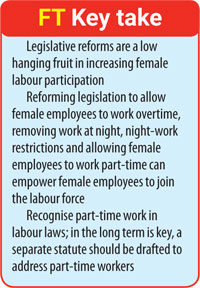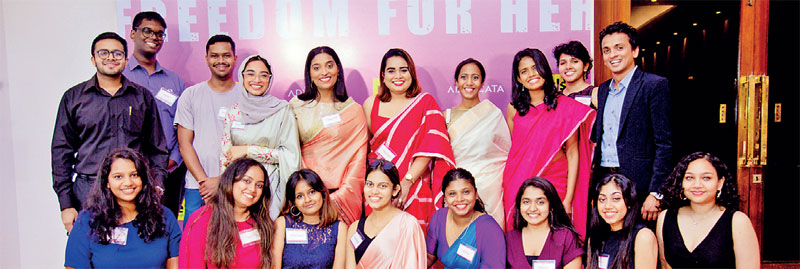Saturday Feb 21, 2026
Saturday Feb 21, 2026
Wednesday, 16 March 2022 00:31 - - {{hitsCtrl.values.hits}}


 Advocata Institute says that Sri Lanka’s labour laws that discourage the entry and retention of women in the labour force are a factor preventing female participation in the workforce.
Advocata Institute says that Sri Lanka’s labour laws that discourage the entry and retention of women in the labour force are a factor preventing female participation in the workforce.
The report identifies the lack of reference to part-time and flexible employment in the existing labour law, time restrictions on employing for women at night, dearth of legal provisions for sexual harassment in employment and restrictions on overtime work for women, as legal obstacles that discourage women joining and actively participating in the workforce.
The report focused on four main areas of discrimination in the labour market: sexual harassment in the workplace, overtime work, work at night, and part-time work. The report highlighted that if these issues were addressed it is likely that female participation in the workforce would greatly improve which would benefit the economy and attract investment (particularly in the context of Sri Lanka’s tight labour market and the cost of labour).
In order to unblock the potential of the female labour force, the Advocata report proposes a series of reforms to existing legislation. These include amendments to the Shop and Office Employees (Regulation of Employment and Remuneration) Act No. 19 of 1945, Wages Board Ordinance No. 27 of 1941, Gratuity Act No. 12 of 1983, Industrial Disputes Act No. 43 of 1950, Factories Ordinance No. 45 of 1942, Employment of Women, Young Persons and Children Act No. 47 of 1956.
The launch event of the report was followed by a panel discussion. The panellists for the discussion included Attorney-at-Law Ayomi Fernando, International Centre for Ethnic Studies Independent Consultant and Research Associate Dr. Ramani Gunatilaka, MAS Women’s Empowerment, Advocacy and Code of Conduct General Manager Thanuja Jayawardene, and Women Parliamentarians’ Caucus Representative MP Thalatha Athukorala. The discussion was moderated by Advocata Institute Research Executive (Policy) Sathya Karunarathne.
MP Thalatha Athukorala stressed the importance of this by highlighting that most of existing legislation need amendments while stressing, “We need to adopt new laws. With new sectors taking part in our economy, we have a need to amend the laws. The [Women’s] caucus has been working on political, social, environmental issues and doing our best effort to bring into the notice of the ministers.”
During the discussion, it was pointed out that firms in the private sector who wish to hire women often have to negotiate their way through complicated and archaic laws. Some firms may even forego this altogether and enter informal agreements which, however, do not provide sufficient protections for women.
Sri Lanka’s failure to recognise part-time employment under the Shop and Office Employees (Regulation of Employment and Remuneration) Act remains such a barrier. According to Thanuja Jayawardene, “Making part-time work available for female employees is an important step in increasing labour force participation. From the business point of view, it is more beneficial to accommodate part-time work rather than lose employees, irrespective of their gender.”
Dr. Ramani Gunatilaka further stressed the importance of the reform, “If part-time work is allowed, young people and students can get experience, develop networks and even start their own businesses. Women can and want to do this. So, reforms are essential.” She further stressed the urgency of implementing these reforms and the impact it can have on the economy, “The working-age population is declining, and unless female labour force participation is boosted, the economy will not be able to grow at the expected rate.”
Ayomi Fernando shared similar insights while bringing into context the importance of recognising the elimination of restrictions on employing women at night. She said, “Provisions preventing women working overtime are affecting the female labour. Women do need protection; however, these laws should be balanced to ensure women have equal opportunities.”

